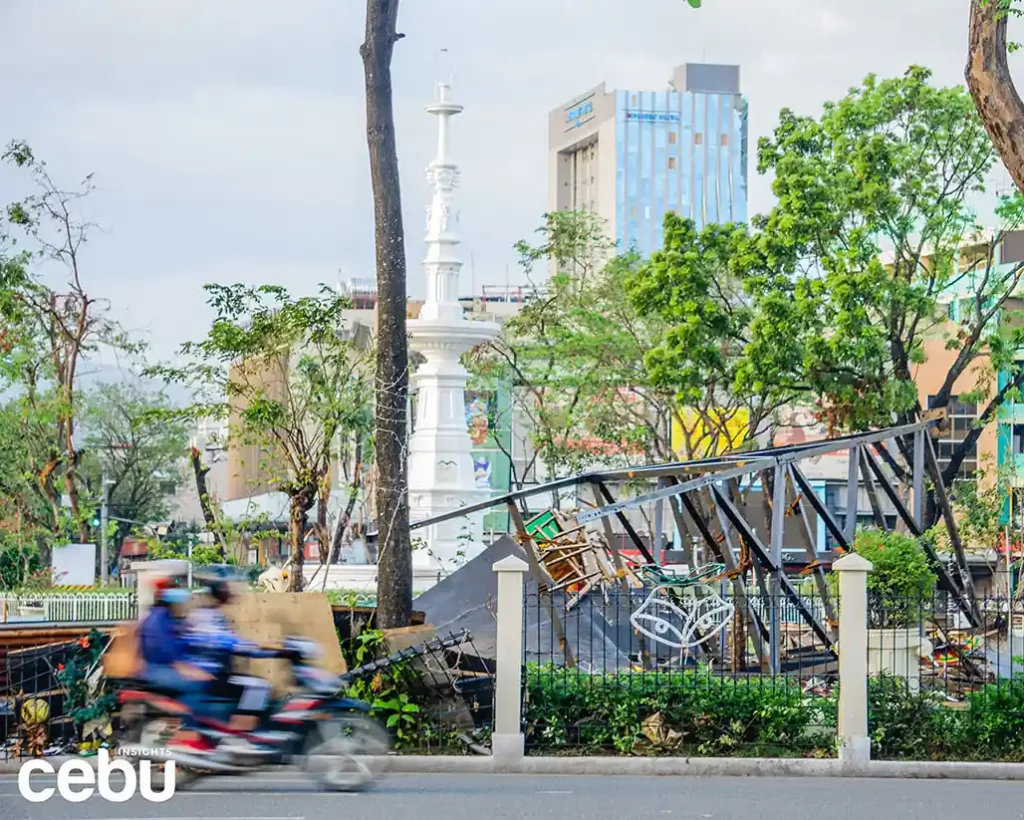Many Cebu tourist spots sustained damage because of Typhoon Rai.
Typhoons are some of the most common natural disasters in the Philippines. With the country located near the Pacific Ocean, it brings in around 20 typhoons every year, causing massive destruction to several homes, streets, and public attractions.
On the evening of December 16, 2021, Cebu was ravaged by Typhoon Rai (locally known as Odette), a Category 5 Super Typhoon. Its landfall caused a ton of destruction to several Cebu tourist spots.
FUENTE TREE OF HOPE
The Christmas Tree of Hope in Fuente was badly damaged by what might be considered one of the
strongest natural disasters in the Philippines in 2021.
The Tree of Hope at the Fuente Osmeña Circle is a go-to tourist spot during Christmas time. The spectacle served as the backdrop for many evening hangouts during the advent season.
In 2020, the yearly bazaar was unfortunately put to a halt to prevent large crowds and gatherings during the COVID-19 pandemic. The lighting ceremony pushed through, but only with a small crowd, while passersby took photos from afar.
The lighting ceremony in 2021 was a success despite maintaining the same restrictions, but by the end of December, the 100-feet tall structure was lying on cold grass and concrete.
As a result of the typhoon, the tree toppled over, dropping the many lanterns and Christmas ornaments. The once festive tourist attraction was left with its steel base lying on the ground.
Sadly, many Cebu tourist spots were affected by the storm.
This is one of the first times the tree was destroyed due to strong storms, as Typhoon Haiyan (locally known as Yolanda) also struck the city in November 2013.
SUGBO MERCADO
Cebu’s beloved food park, the Sugbo Mercado, also suffered some damage during the onslaught of the typhoon.
As the storm slowly passed by Cebu, photos online spread about the destruction it caused to the beloved Sugbo Mercado in IT Park.
Dozens of tents were destroyed because of the strong winds. The barricades and signage fell off, with a number of tree branches scattered around the area.
The Sugbo Mercado branch in Cebu Business Park also had its fair share of wreckage due to the typhoon.
Before and after photos of Sugbo Mercado as a result of Typhoon Rai.
Some trees near the jogging area at CBP were also uprooted, and as a result needed to be cut down.
The Sugbo Mercado branch at Cebu Business Park had to close down due to clearing operations.
SM SEASIDE TOWER
SM Seaside Cebu underwent a lot of damage due to the strong winds of Typhoon Rai.
One would think that SM Seaside, one of the biggest malls in the city, would be sturdy enough to withstand the storm. But as you can see in the picture above, it suffered just as much damage as any other area in the city.
The tower at the center of the mall had several parts of its exterior walls removed due to the strong winds from the typhoon.
As of January 2022, the tower is not yet open to the public. The mall, however, has resumed operations in several stores and restaurants, with various recreational activities now available for shoppers to take part in.
Before and after photos of the SM Seaside Tower as a result of Typhoon Rai.
The interior of the mall was unscathed, which is very fortunate since several people were left stranded inside during the storm. The new Sugbo Mercado that was set to open in the mall was also delayed, as they had to clear the Sky Park for operations.
OTHER STRUGGLES
The storm did not just affect tourist attractions, but also the homes of many of the city’s residents.
For several weeks, there was no electricity or running water, while businesses temporarily closed because of the lack of said utilities.
People had to fall in line early in the morning in the different Cebu City malls and supermarkets to buy essentials like drinking water and toiletries.
Many residents lined up in different Cebu City malls to purchase their necessities.
It was also difficult to find good cell service since many of the telecommunications companies needed line repairs. Internet connection was also down in many areas.
Trees and utility posts brought down by the typhoon have been cleared from the roads, while power was restored in some areas after a few weeks.
Typhoon Rai might be the strongest natural disaster in the Philippines in 2021. It didn’t just hit Cebu, a booming metro city, but also brought massive destruction to countless islands outside of it.
Despite this, Cebuanos found ways to work through the struggles caused by the typhoon. After weeks of having no power, some ended up buying their own generators, while others booked rooms in hotels and condos.
Some drove to IT Park where cell service was much better, while some went back to the countryside where the service was restored much earlier.
You can be assured that despite the damage that these Cebu tourist spots underwent, the city and its people will stand up once again and be stronger than ever.












